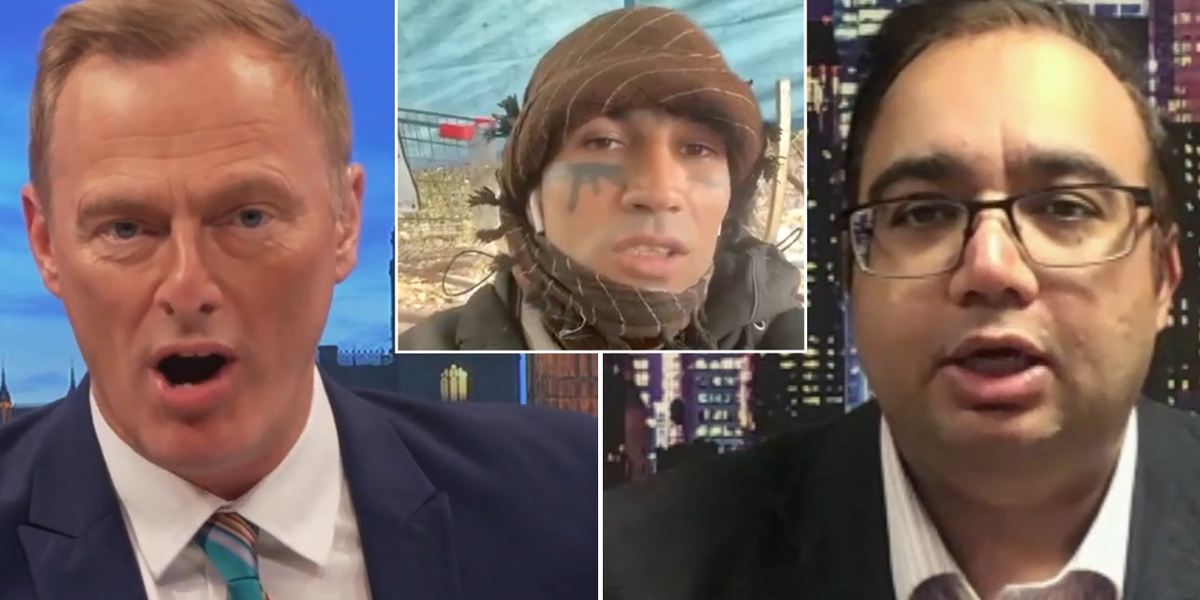A Heated Debate on GB News: Migrant Threats and National Security
In a recent episode of GB News, tensions flared as human rights lawyer Shoaib Khan and political commentator Martin Daubney engaged in a fiery debate regarding the implications of a migrant’s threatening remarks directed at Nigel Farage. The discussion revolved around the controversial question of whether this migrant, who was filmed making a death threat, should be allowed entry into the UK.
The Context of the Debate
The debate was sparked by a video that surfaced showing a migrant responding to comments made by Farage, who has been vocal about his views on immigration and the challenges posed by illegal crossings of the English Channel. In the video, the migrant, believed to be from Afghanistan, expressed hostility towards Farage, leading the politician to label the comments as a “threat on my life.” This incident raised alarm bells about the safety of public figures and the broader implications for national security.
Shoaib Khan’s Argument for Inclusion
Shoaib Khan took a controversial stance, arguing that allowing the migrant into Britain could actually enhance Farage’s safety. He emphasized that deportation is not a viable solution to the issues surrounding immigration and public safety. “If they have committed a criminal offence, we will want to extradite him to the UK and try and prosecute him,” Khan stated, suggesting that the legal system should be allowed to address the situation rather than resorting to exclusion.
Khan’s perspective hinges on the belief that the government has a responsibility to ensure the safety of all citizens, including public figures like Farage. He argued that focusing solely on the financial implications of keeping the migrant in the UK misses the larger point of ensuring public safety.
Martin Daubney’s Counterarguments
Martin Daubney, known for his staunch views on immigration, vehemently opposed Khan’s position. He argued that allowing the migrant into the UK would ultimately make him a liability for taxpayers. “We don’t want to do that – that would then make him our problem,” Daubney asserted, highlighting concerns about the financial burden on the state if the migrant were to be incarcerated.
Daubney’s argument was rooted in a broader skepticism about the implications of welcoming individuals who have made threats against elected officials. He questioned the logic of bringing someone who has already demonstrated hostility into a society that is grappling with issues of safety and security.
The Broader Implications of the Debate
The clash between Khan and Daubney reflects a larger societal debate about immigration, national security, and the responsibilities of the state. Khan’s assertion that keeping the migrant under surveillance in the UK would be a more effective means of ensuring safety raises questions about the efficacy of current immigration policies. Conversely, Daubney’s concerns about the potential consequences of allowing individuals with a history of threats into the country resonate with many who prioritize national security.
The migrant in question, Mada Pasa, has gained notoriety for his social media presence, documenting his journey across Europe. His provocative statements and tattoos, including a gun tattoo on his face, have only intensified concerns about his intentions. The fact that Pasa has been seen in various European countries before attempting to reach the UK adds layers of complexity to the discussion about migration and public safety.
Conclusion: A Divided Perspective
The debate on GB News encapsulates the polarized views surrounding immigration and national security in the UK. While Khan advocates for a more inclusive approach that prioritizes legal accountability and public safety, Daubney’s perspective underscores the fears and financial concerns associated with immigration. As the UK continues to grapple with these pressing issues, discussions like this one will undoubtedly play a crucial role in shaping public opinion and policy.
In a world where the stakes are high and the implications of immigration policies are far-reaching, the dialogue between advocates for human rights and those prioritizing national security will continue to be a contentious and vital part of the national conversation.
